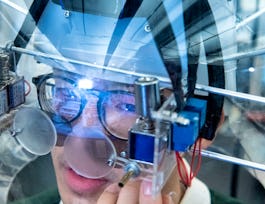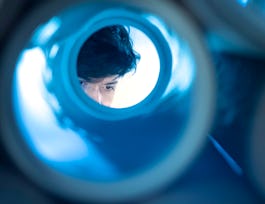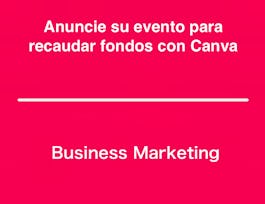Released in June 2021, Artificial Creativity explores the emerging field of creativity in artificial intelligence (AI) from a design perspective, bringing together insights from computer science and creative disciplines. In this course, you will survey the history and theories behind today's creative AI, analyze the unorthodox approaches that have advanced the field, and experience cutting-edge creative AI tools. At the same time, you will learn design thinking research methods, how to implement them for your creative insights, and how to translate them to professional and business contexts. Throughout the course, you will step away from your computer to conduct design research, applying the techniques and theories you learn each week to a topic of your choice. You will also engage with other learners through discussions while challenging and expanding your understanding of creativity.

Artificial Creativity
This course is part of Creativity and AI Specialization
Taught in English
Some content may not be translated

Instructor: Jeongki Lim
7,570 already enrolled
Included with 
Course
(55 reviews)
Recommended experience
What you'll learn
Explain the theories and techniques behind the latest works in artificial creativity.
Characterize and implement various design research methodologies.
Examine the potential of creative AI in everyday experience.
Skills you'll gain
Details to know

Add to your LinkedIn profile
5 quizzes
Course
(55 reviews)
Recommended experience
See how employees at top companies are mastering in-demand skills

Build your subject-matter expertise
- Learn new concepts from industry experts
- Gain a foundational understanding of a subject or tool
- Develop job-relevant skills with hands-on projects
- Earn a shareable career certificate


Earn a career certificate
Add this credential to your LinkedIn profile, resume, or CV
Share it on social media and in your performance review

There are 5 modules in this course
In this module, you will learn what to expect throughout this course, explore machine creativity, and start your first design research observation.
What's included
9 videos5 readings1 quiz3 discussion prompts
In this module, you will learn about the multidisciplinary beginnings of Artificial Creativity, identify the Turing Test, define intelligence, experiment with multiple GPT-2s, and conduct design research analysis.
What's included
13 videos6 readings1 quiz4 discussion prompts
In this module, you will learn about what informed the symbolic approach to AI, how the symbolic approach can be used for creative projects, how to conduct a model simulation, and how to conduct a design research interview.
What's included
13 videos6 readings1 quiz4 discussion prompts
In this module, you will learn about theories on the subsymbolic approach to AI, how to use the subsymbolic approach in a creative project, how to conduct an AI-based creative experiment, and how to conduct design research ideation.
What's included
13 videos3 readings1 quiz4 discussion prompts
In this module, you will learn about the emerging field of computational creativity through concepts, case studies, and GAN-based experiments. You will construct a LoFi prototype using your design research.
What's included
13 videos6 readings1 quiz1 peer review4 discussion prompts
Instructor

Offered by
Recommended if you're interested in Design and Product

Parsons School of Design, The New School

Parsons School of Design, The New School

Coursera Project Network

University of California, Davis
Why people choose Coursera for their career




Learner reviews
Showing 3 of 55
55 reviews
- 5 stars
71.42%
- 4 stars
10.71%
- 3 stars
7.14%
- 2 stars
3.57%
- 1 star
7.14%
New to Design and Product? Start here.

Open new doors with Coursera Plus
Unlimited access to 7,000+ world-class courses, hands-on projects, and job-ready certificate programs - all included in your subscription
Advance your career with an online degree
Earn a degree from world-class universities - 100% online
Join over 3,400 global companies that choose Coursera for Business
Upskill your employees to excel in the digital economy
Frequently asked questions
At least 2 years of experience in a technical field or creative industry is recommended, but not required.
This course is completely online. There is no need to attend any class in person. You can access your lectures, readings and assignments anytime and anywhere via the web or your mobile device.
In this course, you'll look back at the history and theories behind today's A.I., analyze the unorthodox approaches that have advanced the field, utilize current A.I. tools, and practice design thinking methodologies that can be applied to everyday business decision making. You will examine the potential of creative A.I. in everyday experience, and you will implement various design research methodologies through observation, reflective writing and discussion prompts that challenge your own definitions of creativity by taking a closer look at the people and projects that have changed the paradigm of what machines can do.